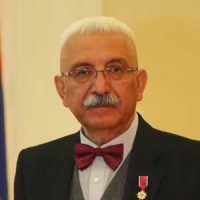Publications
Big Armenian Decisions on Future Relations with Azerbaijan  By Benyamin Poghosyan, PhD, Chairman, Center for Political and Economic Strategic Studies
By Benyamin Poghosyan, PhD, Chairman, Center for Political and Economic Strategic Studies
Relations with Azerbaijan will be the key foreign policy issue faced by the new government, regardless of the outcome of the forthcoming parliamentary elections. Big decisions on future relations with Azerbaijan will have to be taken soon after the new Armenian government is formed after the 20 June elections.
On 10 May 2021, the Armenian Parliament did not elect a prime minister for the second time in a row. According to the Armenian constitution, Parliament was dissolved, and the President signed a decree to hold snap parliamentary elections on 20 June 2021. It is not easy to predict the precise results of the elections. However, we may assume that Armenia will not have a single-party government after the elections. READ MORE
Publications
“All against All” or “All against Nikol”?  By Benyamin Poghosyan, PhD, Chairman, Center for Political and Economic Strategic Studies
By Benyamin Poghosyan, PhD, Chairman, Center for Political and Economic Strategic Studies
Alliances are being formed between Armenian political parties ahead of the 20 June parliamentary elections. Whilst they all claim to want to oust current prime minister Nikol Pashinyan, they are all also busy competing against each other. Despite this, the next Armenian government is likely to be a coalition government.
As Armenia approaches the snap parliamentary elections scheduled for 20 June 2021, the political parties are making final arrangements to form alliances and clarify their positions. The incumbent Prime Minister, Nikol Pashinyan will participate in the elections with his “Civic Contract” party. The second and the third Presidents of Armenia – Robert Kocharyan and Serzh Sargsyan have also clarified their positions. READ MORE
Publications
Armenia’s Reformers Struggle On  By Armen Grigoryan, Vice-president, Yerevan-based Centre for Policy Studies
By Armen Grigoryan, Vice-president, Yerevan-based Centre for Policy Studies
After last year’s war, hopes that the 2018 revolution will fulfil its promise are fading – but it’s not too late for change.
“A stellar performance in one year is no guarantee of future success,” declared The Economist after Armenia held free and fair elections three years ago. The qualified praise was not without cause. It was always likely that Armenia’s attempts at democratic consolidation would be difficult, particularly because of the need for some unpopular reforms. Prior to the December 2018 parliamentary elections, observers noted that civic demobilisation – the influx of non-profit sector professionals to the government and their ensuing unwillingness to criticise it – could potentially undermine political pluralism, enable re-emergent authoritarianism, or foster the rise of right-wing populism. READ MORE
Publications
The EU Will Not Act as a Counterweight to Russia in Either Armenia or NKR  By Benyamin Poghosyan, PhD, Chairman, Center for Political and Economic Strategic Studies
By Benyamin Poghosyan, PhD, Chairman, Center for Political and Economic Strategic Studies
The EU is neither willing nor capable of countering Russia or Turkey in Armenia and Azerbaijan and will not make efforts to decrease Russian influence in Armenia and the unrecognised Nagorno Karabakh Republic.
EU-Armenia relations entered a new phase in 2009 when the EU launched its Eastern Partnership Initiative. Armenia successfully negotiated an Association Agreement with the EU and was going to sign it in autumn 2013. The growing tensions between Russia and the West forced Armenia to cancel the signature, not to ruin relations with its strategic ally. Armenia and the EU started a new round of negotiations in late 2014, culminating with the signature of the Comprehensive and Enhanced Partnership Agreement (CEPA) in November 2017. READ MORE
Publications
The Realistic Policy of Armenia towards Nagorno-Karabakh  By Benyamin Poghosyan, PhD, Chairman, Center for Political and Economic Strategic Studies
By Benyamin Poghosyan, PhD, Chairman, Center for Political and Economic Strategic Studies
The 2020 Karabakh war has dramatically changed the geopolitical status quo in the South Caucasus. Discussions have been underway in Armenia and the Armenian Diaspora about the reasons for the catastrophe and those responsible. Most probably, military defeat will be a key topic during the upcoming June 2021 snap parliamentary elections. The thorough analyses of what happened before, during, and after the war are mandatory tasks to be fulfilled. However, the key for Armenia now to elaborate a new policy towards the Karabakh conflict, taking into account the war results. The most significant issue here is to develop a realistic policy based on accurate calculations, Armenia’s resources, and the interests of external players; otherwise, Armenia may face another catastrophe. READ MORE
Publications
Russian Goals in the Armenian Snap Parliamentary Elections  By Benyamin Poghosyan, PhD, Chairman, Center for Political and Economic Strategic Studies
By Benyamin Poghosyan, PhD, Chairman, Center for Political and Economic Strategic Studies
Armenia is actively preparing for the 20 June 2021 snap parliamentary elections. Political parties are making their final calculations regarding the format of their participation. The main battle will probably occur between the incumbent prime minister, Nikol Pashinyan, and the second president of Armenia, Robert Kocharyan. The latter has already confirmed that he will lead an alliance of two or three parties. The Armenian Revolutionary Federation, the “Motherland” party, established by the former director of the National Security Service, Artur Vanetsyan, and the new “Rebirth Armenia” party established by the former governor of the Syunik region, Vahe Hakobyan, which unites several mayors from the Syunik, may create an electoral bloc under the leadership of Robert Kocharyan. READ MORE
Publications
The Karabakh War: The Lessons of Defeat in the Cyberspace  By Lieutenant-General (Ret.) Hayk S. Kotanjian, PhD, Professor Strategic Security Studies
By Lieutenant-General (Ret.) Hayk S. Kotanjian, PhD, Professor Strategic Security Studies
Reflecting on the lessons of the military aggression of Turkey and Azerbaijan against the Nagorno-Karabakh Republic and the Republic of Armenia, strategic analysts of the security institutions and processes continue to monitor the dynamics of the peace-war around Karabakh in the context of the world order transformation. Russian President Vladimir Putin at the session of the Russian Security Council of March 26, 2021, emphasizing the exceptional role of cybersecurity, pointed out the strategic priority of the development of the cyberspace resources management system. In general, this coincides with the assessments of the special significance of this security sector, voiced recently by the US President Joe Biden and Chinese President Xi Jinping. READ MORE
Publications
A Vote Largely Motivated by Hate in Armenia’s June ‘21 Elections  By Benyamin Poghosyan, PhD, Chairman, Center for Political and Economic Strategic Studies
By Benyamin Poghosyan, PhD, Chairman, Center for Political and Economic Strategic Studies
Former president Robert Kocharyan has emerged as the strongest challenger to prime minister Nikol Pashinyan in Armenian’s forthcoming parliamentary elections. However, most voters are simply motivated by their hate of one or the other.
Armenia is looking forward to the snap parliamentary elections scheduled for June 20, 2021. According to the preliminary agreement between the ruling "My step" faction and the two parliamentary opposition parties, prime minister Nikol Pashinyan will resign at the end of April, beginning of May; Parliament will not elect a new prime minister twice; and will thereafter be automatically dissolved as provided for by the Armenian constitution. READ MORE